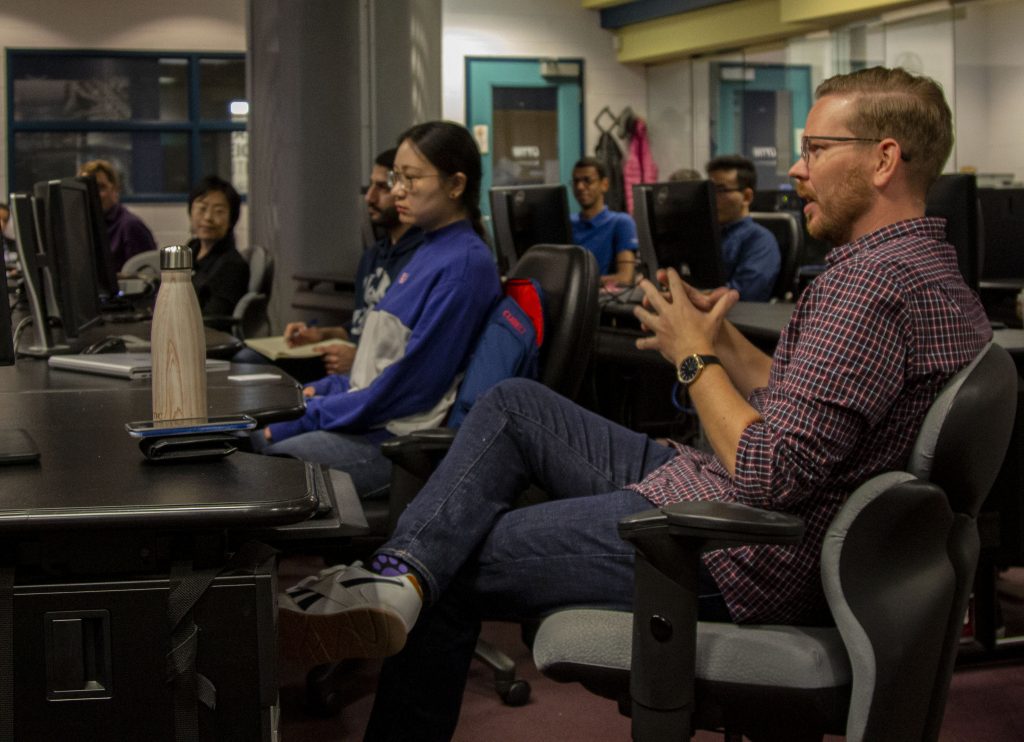
The idea of using cargo bikes for delivery is widely popular in the US and UK.
But how efficient are they? Can they substitute for delivery trucks to reduce greenhouse gas (GHG) emissions?
Onkar Chander, a recent U of T transportation engineering graduate, presented “Assessing electric assist cargo tricycle operations at the U of T campus” as part of the UT-ITE seminar series on September 27.
Chander’s research project is an outcome of collaboration between the Smart Freight Centre, UTTRI and Purolator. The project was supervised by Professor Matthew Roorda. The team also received great support from U of T’s Sustainability Office.

The project evaluates the efficiency of the electric assist cargo tricycle on optimized delivery routes. The efficiency is calculated on factors (speed, parking, demand, capacity, cost and reliability) that impact the electric assist cargo tricycle’s trip in reaching the destination from the package depot.
The project ran a pilot on the University of Toronto’s downtown campus and produced positive results, indicating that the replacement of one delivery truck with an electric assist cargo tricycle can save upwards of 1.9 Metric ton of CO2 per year.

The presentation was followed by questions from attendees and discussion.

Abstract
This project is the outcome of a collaboration between the Smart Freight Centre, the University of Toronto Transportation Research Institute (UTTRI), and Purolator Courier. The project assesses the financial and operational feasibility of electric assist (EA) cargo tricycles as a last mile delivery method for Purolator on the University of Toronto campus.
With strong growth in e-commerce, more Canadians are purchasing goods online than ever before. Courier companies such as Purolator are experiencing growing pains of last mile logistics in urban delivery due to increased road congestion, lack of commercial vehicle parking, inadequate loading facilities, and capacity issues. This has sparked the desire to investigate alternative cost effective, and efficient goods and package delivery modes in dense urban centres. Cargo tricycles for last mile urban delivery are a proven concept in various parts of the world. They have high potential to reduce GHG emissions, road congestion and parking violations.
Using route specific package delivery data, the research assesses operating parameters including speed, parking, demand, capacity, cost, reliability, and restrictions with the use of cargo bikes for last mile delivery. Using a geographic information system (GIS) software, a network is built to model three scenarios to determine the optimal routing using a cargo tricycle to complete deliveries. The results indicate a preferred urban consolidation center location on the University of Toronto campus based on comparison of total time, cost, and distance savings. The replacement of one delivery truck with a cargo tricycle cansave upwards of 1.9 Metric ton of CO2 per year on the University of Toronto campus. The results also indicate the importance and need of bicycle infrastructure to make cargo tricycles feasible. There is a 40% increase in service time per customer if operations are modeled in a restricted network utilizing only private roads on campus. The report concludes by providing top five recommendations for the successful implementation of cargo tricycle operations.
Onkar Chander is a Specialist in the Operations Excellence team at Purolator. He is a recent graduate from the University of Toronto, where we completed his Master of Engineering in Transportation Engineering & Planning. He holds a BASc in Mechanical Engineering from the University of Ottawa, where he graduated with summa cum laude honors distinction. He has in-depth knowledge and experience in the logistics industry as a class AZ commercial truck driver, and logistics coordinator specializing in the movement of long-haul refrigerated freight across Canada and the United States. He has strong interests in automation, connected and autonomous vehicles and mobility within the Transportation and Logistics Industry. In his free time, he enjoys watching the Toronto Raptors and working on strategy case competitions.
This seminar was presented by the University of Toronto Institute of Transportation Engineers (ITE) Student

